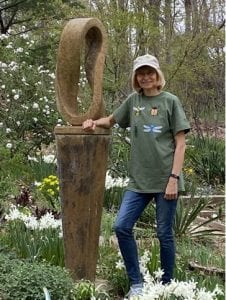UConn CAHNR Extension typically holds Bug Week in July; however, this year Extension has designated July as Bug Month. The UConn Extension Master Gardeners and Master Gardener interns participate. Bug Month is an educational outreach activity that promotes insects in the environment (bugs.uconn.edu/). Volunteers like Dr. Lynn Keller make this educational event fun and successful. In order to become a Master Gardener people need to attend and complete the Master Gardener program that includes coursework, office hours, and community service. The training allows them to become knowledgeable about various gardening topics.
 Lynn heard about the UConn Extension Master Gardener program many years ago and completed the program in 2019. She learned about a volunteer opportunity to assist with Bug Week from Gail Reynolds, the Middlesex County Master Gardener program coordinator. Lynn enjoyed her entomology (study of insects) classes in college while studying to be a veterinarian. She also enjoyed the entomology class offered by the Master Gardener program and felt like it would be a good fit for her interests.
Lynn heard about the UConn Extension Master Gardener program many years ago and completed the program in 2019. She learned about a volunteer opportunity to assist with Bug Week from Gail Reynolds, the Middlesex County Master Gardener program coordinator. Lynn enjoyed her entomology (study of insects) classes in college while studying to be a veterinarian. She also enjoyed the entomology class offered by the Master Gardener program and felt like it would be a good fit for her interests.
As a volunteer, Lynn works with various program leaders to coordinate dates and events during Bug Month in July. These activities include bug kits for youth, photo contests, and educational activities. Part of her role includes finding new leaders for these programs and ensuring they have the proper resources as well as creating content for the Bug Month website (bugs.uconn.edu/). New programs are suggested every year, and Lynn works with the team to implement them in addition to fundraising and finding sponsors. She also promotes Bug Month by writing articles and participating in local radio shows.
Bug Month is designed for family participation, and Lynn enjoys educating families on the importance of insects in our lives. She says, “If we didn’t have insects, we wouldn’t have pollination, which would result in missing out on many of our favorite foods.” Her volunteer work is making an impact because adults and children are learning more about the “integral role that insects play in the food web and in our environment.” She also notes that this program provides suggestions for simple steps families can take to improve beneficial insect habitats in their yards and communities.
One of Lynn’s favorite memories from her time as an Extension volunteer is at Bug Week events in 2019. Many children attended the event at the Tolland Agricultural Center and were excited to participate in the fun activities. Lynn enjoyed seeing the children’s enthusiasm while they were looking at bugs under a microscope and learning about them. She also enjoys continuing her education on native plants and insects which allows her to share this information with family and friends. Her advice to new volunteers is to find an opportunity that you are passionate about and use that passion to make a positive difference in our communities.
The UConn Extension Master Gardener Program started in 1978 and consists of horticulture training and an outreach component that focuses on the community at large. Master Gardeners devote thousands of hours to organized community outreach projects each year. The Master Gardener program also offers Garden Master Classes for our volunteers and interested members of the general public. More information on the program and classes are available at mastergardener.uconn.edu.
UConn CAHNR Extension has more than 100 years’ experience strengthening communities in Connecticut and beyond. Extension programs address the full range of issues set forth in CAHNR’s strategic initiatives:
- Ensuring a vibrant and sustainable agricultural industry and food supply
- Enhancing health and well-being locally, nationally, and globally
- Designing sustainable landscapes across urban-rural interfaces
- Advancing adaptation and resilience in a changing climate.
Programs delivered by Extension reach individuals, communities, and businesses in each of Connecticut’s 169 municipalities. Learn more about our volunteer programs at s.uconn.edu/volunteers.
Article by Emily Syme